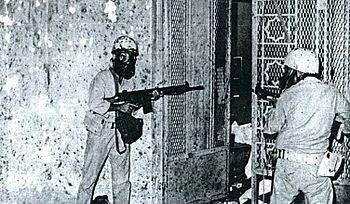Muhammad bin abd Allah al-Qahtani
| Grand Mosque seizure | |||||||
|---|---|---|---|---|---|---|---|
 Saudi soldiers fighting their way into the Ka'aba underground beneath the Grand Mosque of Mecca, 1979 |
|||||||
|
|||||||
| Belligerents | |||||||
|
|
|||||||
| Commanders and leaders | |||||||
|
|
|
||||||
| Strength | |||||||
|
300–600 militants | ||||||
| Casualties and losses | |||||||
|
|
||||||
Saudi Arabian victory
The Grand Mosque seizure occurred during November and December 1979 when extremist insurgents calling for the overthrow of the House of Saud took over Masjid al-Haram in Mecca, Saudi Arabia. The insurgents declared that the Mahdi (the "redeemer of Islam") had arrived in the form of one of their leaders – Mohammed Abdullah al-Qahtani – and called on Muslims to obey him. For nearly two weeks, Saudi Special Forces assisted by Pakistani and French commandos fought pitched battles to reclaim the compound.
The seizure of Islam's holiest site, the taking of hostages from among the worshipers, and the deaths of hundreds of militants, security forces and hostages caught in crossfire in the ensuing battles for control of the site, all shocked the Islamic world. The siege ended two weeks after the takeover began and the mosque was cleared. Following the attack, the Saudi state implemented a stricter enforcement of Islamic code.
The seizure was led by Juhayman al-Otaybi, a member of an influential family in Najd. He declared his brother-in-law Mohammed Abdullah al-Qahtani to be the Mahdi, or redeemer, who arrives on earth several years before Judgement Day. His followers embellished the fact that Al-Qahtani's name and his father's name are identical to Prophet Mohammed's name and that of his father, and developed a saying, "His and his father's names were the same as Mohammed's and his father's, and he had come to Makkah from the north," to justify their belief. The date of the attack, 20 November 1979, was the first day of the year 1400 according to the Islamic calendar, which was stated by another hadith as the day that a Mujaddid would reveal himself.
...
Wikipedia
